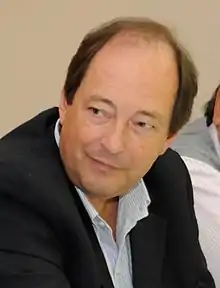Ernesto Sanz
Ernesto Sanz (born 9 December 1956) is a former Argentine politician of the Radical Civic Union and one of the founders of Cambiemos. He served in the Argentine Senate representing Mendoza Province from 2003 to 2015.
Ernesto Sanz | |
|---|---|
 | |
| President of the National Committee of the Radical Civic Union | |
| In office 5 December 2009 – 16 December 2011 | |
| Preceded by | Gerardo Morales |
| Succeeded by | Mario Barletta |
| In office 14 December 2013 – 4 December 2015 | |
| Preceded by | Mario Barletta |
| Succeeded by | José Manuel Corral |
| National Senator | |
| In office 10 December 2003 – 10 December 2015 | |
| Constituency | Mendoza |
| Mayor of San Rafael | |
| In office 10 December 1999 – 10 December 2003 | |
| Provincial Senator of Mendoza | |
| In office 10 December 1993 – 10 December 1999 | |
| Personal details | |
| Born | 9 December 1956 San Rafael, Mendoza Province Argentina |
| Political party | Radical Civic Union |
| Other political affiliations | Cambiemos |
| Spouse | Cristina Bessone |
| Alma mater | National University of the Littoral |
| Profession | Lawyer |
Early life and education
Sanz was born in San Rafael, Mendoza. He enrolled at the National University of the Littoral, and earned a law degree in 1981. Sanz married Cristina Bessone, and the couple had two children. Following the return of democracy in 1983, he became an adviser to the Governor of Mendoza, Santiago Llaver. He also taught at the National University of Cuyo Law School from 1984 to 1986, and maintained a private practice.[1]
Political career
He was elected to the UCR Youth Chapter's National Committee in 1987, and as President of the San Rafael Department chapter of the UCR in 1991. He served as a provincial senator from 1993, acting as President of the UCR caucus from 1995, and in 1999 became mayor of San Rafael.[1]
National Senator
Sanz was elected Senator for Mendoza in 2003. He joined the Senate Budget and Domestic Economic Policy committees, and later the Constitutional, Investment, Argentina-Chile relations, and Federal Budget Sharing committees, among others. He was elected ranking member of the Budget Committee, and in 2007, leader of the UCR Senate caucus.[1] Sanz ran for Vice-Governor with Roberto Iglesias in 2007; the ticket, however, was defeated by Justicialist Party candidate Celso Jaque, and finished in fourth place with 10% of the vote.[2] Sanz suffered an automobile accident in March 2008 while driving along the Atuel River in Mendoza; he recovered quickly.[3] Sanz was reelected to the Senate in a landslide in 2009.[4]
UCR National Committee president
In December 2009, Sanz was elected President of the UCR National Committee. On 2 March 2011 he announced his candidacy for the UCR presidential primary scheduled for 30 April. His chief opponent, Congressman Ricardo Alfonsín, was described by Sanz as "an appeal to nostalgia" (in reference to the latter's father, former President Raúl Alfonsín).[5] Sanz withdrew shortly before the 28 April primary, however, and Alfonsín himself placed third in the 2011 general election.
The UCR organized the Broad Front UNEN political coalition, but it stayed behind in the opinion polls for the 2015 elections.
At the radical convention on 14 March 2015 in Gualeguaychú (Entre Ríos), Sanz and Cobos presented their proposals: Cobos proposed a front of center-left parties, while Ernesto Sanz proposed that the Radical Civic Union lead a broad coalition opposing Kirchnerism for the presidential elections of 25 October, which includes the ARI Civic Coalition led by Elisa Carrió and the Republican Proposal (PRO) of Macri.
Cobos, supported by Gerardo Morales and Deputy Ricardo Alfonsin, obtained 114 votes, while the position held by those who supported Sanz reached 186 votes.
The UCR joined Macri's Republican Proposal to create the Cambiemos coalition. Macri, Sanz and Elisa Carrió ran for the coalition's primary election, which was won by Macri. Macri won the presidential elections afterwards. It was rumored that Sanz would be the minister of Justice in Macri's cabinet, but he retired from politics for personal reasons.
References
- Senate profile
- "Atlas Electoral de Andy Tow. Mendoza: Gobernador (2007)". Archived from the original on 17 July 2011. Retrieved 6 March 2011.
- Se accidentó el senador Ernesto Sanz, Clarín, 16 March 2008.
- "Atlas Electoral de Andy Tow. Mendoza: Senador (2009)". Archived from the original on 17 July 2011. Retrieved 6 March 2011.
- Buenos Aires Herald: Sanz launches presidential bid (in Spanish)
External links
- Official Website (Spanish)
- Official Blog (Spanish)
